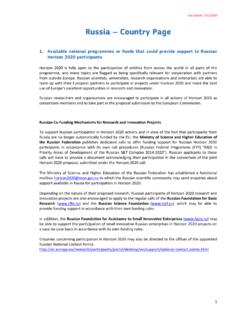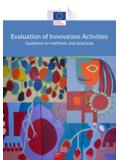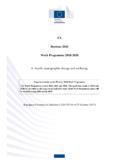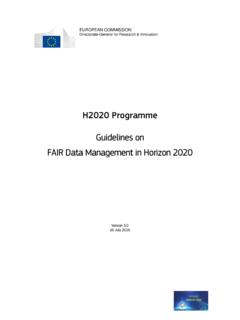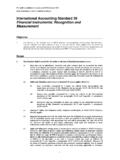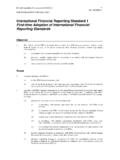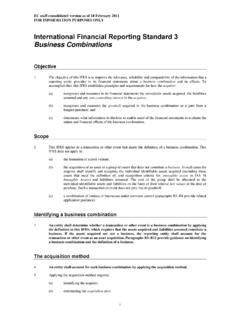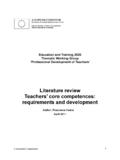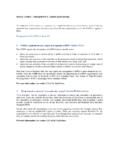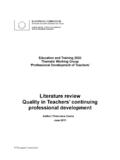Transcription of Antitrust - European Commission
1 Internal DG Competition working documents on procedures for the application of Articles 101 and 102 TFEUM arch 2012 AntitrustManual of ProceduresCompetition Antitrust manual of Procedures Internal DG Competition working documents on procedures for the application of Articles 101 and 102 TFEU March 2012 The text is made available on the internet: ISBN 978-92-79-23360-9 doi European Union, 2012. Reproduction is authorised, provided the source is acknowledged. Notice DG Competition's manual of Procedures for the application of Articles 101 and 102 TFEU is an internal working tool intended to give practical guidance to staff on how to conduct an investigation applying Articles 101 and 102 TFEU. The Antitrust manual of Procedures does not contain binding instructions for staff, and the procedures set out in it may have to be adapted to the circumstances of the case at hand.
2 It is oriented towards the practical needs of case teams. The practical guidance given in the manual does not claim to be complete or exhaustive and not every question that might arise is dealt with, or dealt with in the same level of detail. The content of the manual has not been adopted by the Commission . It is a practical working tool, which evolves through updates made on a regular basis to reflect new experience gained in applying the competition rules of the Treaty, and the Regulations, notices and other guidance adopted thereunder. In case of divergences between these rules and the Antitrust manual of Procedures, the former apply. Staff has been instructed that, in case of doubt, they should always seek instructions from their hierarchy regarding the precise course of action in a particular situation. The main chapters of the Antitrust manual of Procedures are being made public in order to provide greater transparency about the Commission s procedures in applying the competition rules.
3 The fact that the modules are in the public domain does not change their character as purely internal guidance to staff. The published modules therefore do not create or alter any rights or obligations arising under the competition rules of the Treaty. Updates to the modules will be made public at regular intervals. Developments since this version of the Antitrust manual of Procedures was published (such as new case law) may therefore not yet be reflected. Brussels, 2012 List of Modules 1. Decision-making procedures 2. Relations with the Hearing Officers 3. Cooperation with National Competition Authorities (ECN) 4. Cooperation with National Courts 5. Cooperation with Competition Authorities in Third Countries 6. Requests for information (Article 18 of Reg. 1/2003) 7. Sector inquiry (Article 17 of Reg. 1/2003) [under construction] 8.
4 Power to take statements (Article 19 of Reg. 1/2003) 9. Dealing with Leniency Applications 10. Opening of proceedings 11. Statement of Objections (SO) 12. Access to file and Confidentiality 13. Right to be heard (Written phase and Hearing) 14. Advisory Committee 15. Prohibition decision (Article 7 of Reg. 1/2003) 16. Commitment decision (Article 9 of Reg. 1/2003) 17. Interim Measures (Article 8 of Reg. 1/2003) 18. Finding of Inapplicability (Article 10 of Reg. 1/2003) 19. Remedies and Fines (Article 23 of Reg. 1/2003) [under construction] 20. Periodic penalty payment (Article 24 of Reg. 1/2003) 21. Handling of complaint 22. Informal Guidance 23. Closure of proceedings 24. Administrative closure of the file 25. Follow-up of Decisions 26. Court Litigation 27. Use of languages 28. Publication of decisions Page 1/19 Decision-making procedures 1 Decision-making procedures 1.
5 General principles governing decision-making in the Commission 2 Sources 2 The principle of collegiality and the decision making procedures 2 Decisions of principle: oral or written procedure 2 Measures of management and administration: empowerment, sub-delegation and direct delegation 3 Measures of pure administration 3 The involvement of other services 4 2. Choice of the applicable decision-making procedure in Antitrust cases 4 Measures reserved to the College 4 Oral procedure 5 Written procedure 5 Empowerment of the Competition Commissioner 5 Empowerment of the Competition Commissioner for the application of Regulation No 1/2003 6 Empowerments relating to the Leniency Notices 9 Empowerments relating to the co-operation with the United States and Canada 10 Ad hoc empowerment 10 Measures sub-delegated by the Competition Commissioner to the Director General 10 Measures delegated by the Commission to the Hearing Officers 11 Measures of pure administration ( de pure gestion ) 13 3.
6 Involvement of other services 14 Inter-service consultation prior to the adoption of measures reserved to the College 14 Choice of the departments to be consulted 14 Consultation procedure 15 Involvement of other Services prior to the adoption of measures under the empowerment and sub-delegation procedures 15 Necessary prior approval of the Legal Service 15 Involvement of services other than the Legal Service 15 Antitrust manual of Procedures 1. General principles governing decision-making in the Commission Sources (1) The way in which the Commission operates and takes decisions is set out in the Rules of Procedure of the Commission of (C(2010)1200 final)1 (hereinafter the Rules of Procedure ); the Rules of Procedure set out the various procedures for adopting Commission acts, how those decisions are prepared and implemented and how the departments supporting the Commission are to be organized.
7 In the Rules giving effect to the Rules of Procedure of the Commission , also adopted on (C(2010)1200 final)(hereinafter the Rules giving effect ); the Rules giving effect supplement the Rules of procedure and spell out in detail how the latter are to be applied in practice. (2) Explanations concerning the rules contained in those two basic documents, as well as useful information on their application in practice are accessible via the manual of Operating Procedures on the Secretariat General s intranet site. The principle of collegiality and the decision making procedures (3) According to Article 17 (6) of the Treaty on European Union (ex. Art. 217(1) EC) and Article 1 of the Rules of Procedure decision-making in the Commission is based on the principle of collegiality. In other words, as a general rule, Commission decisions must be taken collectively by all Commissioners and all Commissioners are collectively responsible for those decisions.
8 The delegation of decision-making powers to individual Commissioners or Directors General is regarded by the Treaty and the Rules of Procedure as an exception and is therefore subject to limitations. (4) Commission decisions are either taken at the Commission s weekly meeting ( oral procedure ), by written procedure, by empowerment (which includes the possibility of sub-delegation), or by direct delegation. Decisions of principle: oral or written procedure (5) All decisions of principle involving a margin of political discretion or appreciation must be adopted by the College through oral or written procedure. Such decisions of principle cannot be delegated to individual Commissioners and even less to the Commission services. (6) The oral procedure (Articles 5 to 11 of the Rules of Procedure) reflects best the collegial nature of Commission decision making, since it provides for an opportunity for discussion between Commissioners.
9 Commission acts are adopted during the weekly meeting (normally on 1 OJ L 308, , , as amended by Commission Decision of 24 February 2010, (2010/138/EC, Euratom), OJ L55 of , p. 60. Page 3/19 Decision-making procedures Wednesday) either without discussion (A point) or following discussion between Commissioners (B point). (7) The written procedure (Article 12 of the Rules of Procedure) aims to relieve the Commissioners of the need to debate matters the adoption of which are not controversial and have been discussed between the head of Cabinets at preparatory meetings on basis of the submitted documents for adoption, approved by the Legal Service and other department directly involved during the inter-service consultation. Measures of management and administration: empowerment, sub-delegation and direct delegation (8) A category of measures to be distinguished from the decisions of principle are the so-called measures of management or administration ( mesures de gestion ou d administration ).
10 This category of measures includes measures which are of an investigatory or preparatory nature only, in view of a later final decision to be taken by the College, and/or leave the Commission no or only a limited margin of appreciation or discretion, and/or are routine matters, whose adoption by the College would entail a disproportionate demand on Commissioners time. (9) Measures of management or administration can be: delegated by the College of Commissioners to individual Commissioners who then adopt the measure under the so-called empowerment procedure ( proc dure d habilitation , Article 13(1) of the Rules of Procedure); empowerments are either general (a Commissioner is empowered to adopt a given category of acts) or ad hoc (a Commissioner is empowered to adopt a specific act in a specific case); sub-delegated, by a so empowered Commissioner to a Director-General or Head of Service who then adopts the measures under the sub-delegation procedure (Article 13(3) of the Rules of Procedure).
